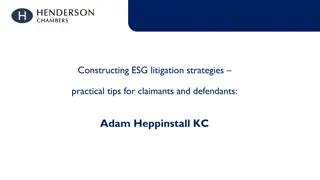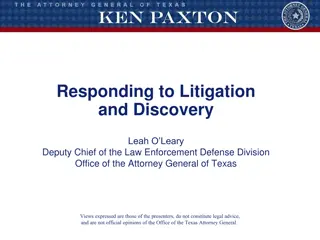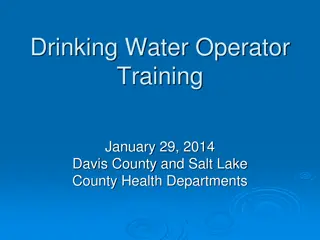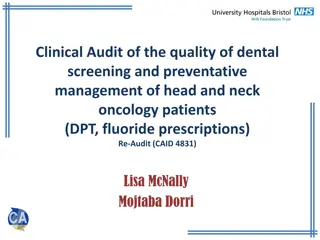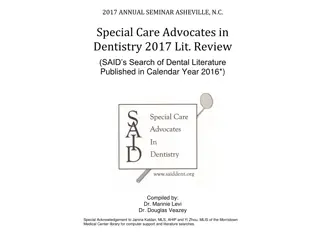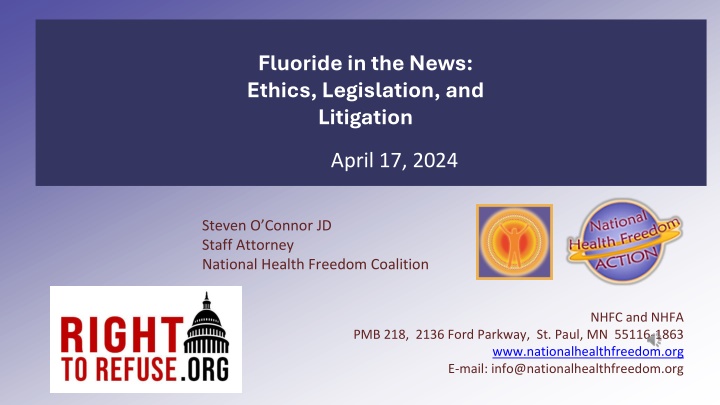
Fluoride Controversy: Ethics, Legislation, and Health Effects Explained
Discover the debate surrounding fluoride in public water supply, tackling ethical concerns, legislative actions, and health impacts. Learn about differing perspectives from organizations like the American Dental Association and the Fluoride Action Network, shedding light on the legal, ethical, and scientific aspects of fluoridation. Unravel the complex landscape of fluoride use, exploring its benefits in dental health contrasted with potential risks to brain development and medical ethics implications of mass medication via water fluoridation.
Download Presentation

Please find below an Image/Link to download the presentation.
The content on the website is provided AS IS for your information and personal use only. It may not be sold, licensed, or shared on other websites without obtaining consent from the author. If you encounter any issues during the download, it is possible that the publisher has removed the file from their server.
You are allowed to download the files provided on this website for personal or commercial use, subject to the condition that they are used lawfully. All files are the property of their respective owners.
The content on the website is provided AS IS for your information and personal use only. It may not be sold, licensed, or shared on other websites without obtaining consent from the author.
E N D
Presentation Transcript
Fluoride in the News: Ethics, Legislation, and Litigation April 17, 2024 Steven O Connor JD Staff Attorney National Health Freedom Coalition NHFC and NHFA PMB 218, 2136 Ford Parkway, St. Paul, MN 55116-1863 www.nationalhealthfreedom.org E-mail: info@nationalhealthfreedom.org
Fluoride pro and con. Unconsented medical intervention. Practicing medicine without a license? How is it legal/ethical? Local and state efforts to remove, or decline to use, fluoride Federal trial in San Francisco
American Dental Association: Water fluoridation is safe, effective and healthy. Seventy years of research, thousands of studies and the experience of more than 210 million Americans tell us that water fluoridation is effective in preventing cavities and is safe for children and adults.
Fluoride Action Network: The Brain Fluoride s ability to damage the brain is one of the most active areas of fluoride research today. Over 400 studieshave found that fluoride is a neurotoxin (a chemical that can damage the brain). This research includes: Over 200 animal studies showing that prolonged exposure to varying levels of fluoride can damage the brain, particularly when coupled with an iodine deficiency, or aluminum excess; 74 human studies linking moderately high fluoride exposures with reduced intelligence; Over 60 animal studies reporting that mice or rats ingesting fluoride have an impaired capacity to learn and/or remember; 12 studies (7 human, 5 animal) linking fluoride with neurobehavioral deficits (e.g., impaired visual-spatial organization); 3 human studies linking fluoride exposure with impaired fetal brain development. 9 Mother-Offspring studies linking certain levels of fluoride in the urine of pregnant women to reduced IQ in their offspring.
Fluoride Action Network: MEDICAL ETHICS Unlike all other water treatment processes, fluoridation does not treat the water itself, but the person consuming it. The Food & Drug Administration accepts that fluoride is a drug, not a nutrient, when used to prevent disease. By definition, therefore, fluoridating water is a form of mass medication. This is why most western European nations have rejected the practice because, in their view, the public water supply is not an appropriate place to be adding drugs
Fluoridation or any practice that uses the public water supply as a vehicle to deliver medicine violates medical ethics in several important ways: It deprives the individual of his or her right to informed consent to medication. It is approved and delivered by people without medical qualifications. It is delivered to everyone regardless of age, health or nutritional status, without individual oversight by a doctor and without control of dose. The safety and effectiveness of fluoridated water has never been demonstrated by randomized controlled trials the gold standard study that is now generally required before a drug can enter the market.
The Ethics of Water Fluoridation Mary McNally, M.Sc., DDS Jocelyn Downie, MA, Mlitt., LLM, SJD Canadian Dental Association, 2000 The liberal individualist arguments against the involuntary medication of populations may initially seem compelling. However, Canadian society has established a core set of values which allow for the infringement of individual rights in certain instances. For example, mandatory vaccinations, fortification of foods with essential nutrients, and testing for certain genetic diseases at birth are accepted public health measures despite the fact that these measures can be seen as an infringement on individual rights.
British Fluoridation Society: Ethics of Water Fluoridation Dental caries (tooth decay) is still a major public health problem. Major inequalities in dental health persist between different social groups. Fluoridation replicates a naturally occurring benefit. There is no right to drink fluoride-free water, merely a personal preference. Fluoride is a nutrient, not a drug or medication. [!] There is a duty to protect citizens, especially the most vulnerable. A stewardship model of society places emphasis on caring for one another.
As bans spread, fluoride in drinking water divides communities across the US: USA Today April 10, 2024 With fluoride in so many dental products, some say adding it to drinking water is no longer necessary. But health experts worry that like vaccines, fluoridation may be a victim of its own success.
In recent years hundreds of communities from Oregon to Pennsylvania have either stopped adding fluoride to water supply or voted against adding it. Fluoride Action Network indicates that since 2010 over 240 communities around the globe have either removed fluoride or decided not to add it. Portland, Oregon, is the largest city in the USA that has consistentlyrefused to fluoridateits drinking water. Voters have repeatedly rejected measures to add it, first in 1956 and most recently in 2013. Despite the recommendations of local doctors and dentists, voters in Wichita, Kansas, have rejected adding fluoride to the water multiple times, last in 2012
States and localities debate the future of community water fluoridation: American Dental Association, February 27, 2024
Rutland City, Vermont The Board of Aldermen approved a ballot measure in Rutland City, Vermont, where voters will decide whether or not to keep fluoride in the city s water supply. Opponents of water fluoridation collected enough signatures in support of a referendum that it will appear on the city s Town Meeting Day ballot March 5. If it passes, the initiative will remove fluoridation from the city s water, which has been in effect since 1983. Update: Fluoride ban fails in Rutland. 2,031 no votes; 1,334 in favor per unofficial results. Lebanon, Oregon In Lebanon, Oregon, the city council passed a motion in December 2023 that puts the question of whether or not to remove fluoride from water treatment processes on the November 2024 general election ballot. The motion passed 4-2. Prior efforts to remove fluoride via petition have failed.
Kentucky HB141 Kentucky lawmakers have proposed a bill that would permit local municipalities and water districts to stop fluoridating their water if they choose. Current law requires the state to establish, maintain, monitor and enforce water fluoridation programs. Under the new law, water systems that are currently operating would continue until their governing body votes to end its participation. Although the bill s sponsor, Rep. Mark Hart, R-Ky., has proposed the measure in the past, this is the first time it received a committee hearing. The bill passed the state House committee on a 16-1 vote. Update: 03/27/24 Sent to Appropriations & Revenue
Georgia SB408 SB408 in Georgia would remove the state s authority to require fluoridation and instead offer the option for communities to choose whether or not they want community water fluoridation. It would also remove the 1 ppm limit on fluoridation and the tax deduction allowed for those with an allergy to fluoride. Currently, the state has authority to require community water fluoridation unless a community removes itself from the requirement by referendum. Status: Referred to committee January 26, 2024 Nebraska LB1387 Starting in 2025, LB1387 would change local fluoridation laws. Currently the law mandates fluoridation for towns with over 1,000 people unless a town affirmatively votes to end it. The bill says that towns of any size must specifically adopt a local ordinance in order to continue fluoridation. LB1387 passed the Health and Human Services committee, yet was not voted on by full legislature. Status: Likely to be re-filed for the next session.
Missouri HB1621 A proposed amendment to Missouri s early notification law would fortify the existing requirement that water systems provide prior notice when modifying their fluoridation operations. Current law requires water systems to publicize proposed fluoridation changes at least 90 days prior to any vote. The new law would add that, prior to publicizing the plan to vote, water systems that intend to start or stop water fluoridation must seek and receive local health departments information on fluoride s impact on public health. Status: Read Second Time, 1/4/24
North Carolina SB658: Water Safety Act of 2023 SB658 would require a review of the National Toxicology Program Monograph to determine if there is sufficient evidence for a link between fluoride in the public water supply and cognitive decline or any other neurological detriment in children. The NTP Monograph includes evaluations of the evidence that environmental substances are associated with noncancer health effects. The NTP report has not yet been approved for final release. The National Academies of Science, Engineering and Medicine twice sent the monograph back for review because of questions on whether the science supported the proposed claims. Currently, a panel is reviewing the report again before a final release. Bill covers both fluoride and PFAS. Status: stuck in committee since April 2023. Session ends July 2024.
Litigation: Food & Water Watch Inc. v. EPA Bloomberg Law, January 2024
The health effects of a cavity-fighting chemical backed by health providers for decades will be on trial starting Wednesday, marking a unique development in implementation of the EPA s landmark chemicals law. A federal judge in California will decide if adding fluoride to the drinking water of 200 million Americans is too risky for children s developing brains based on research showing it could lower their IQs. If Judge Edward M. Chen decides fluoride poses an unreasonable risk, the Environmental Protection Agency would have to restrict its drinking water use in some way.
The case, Food & Water Watch Inc. v. EPA, is the first- ever trial challenging the EPA s dismissal of a citizens petition to compel a regulation using a section of the Toxic Substances Control Act (TSCA) that allows such petitions. It also puts a judge in the uncommon role of judging science without deference to a federal agency. TSCA specifies that determinations of unreasonable risk of injury to health must be made without consideration of costs or other non-risk factors. That means evidence on fluoride s benefits can t be introduced, Judge Chen ruledin 2020. Status: Judge in deliberations since mid-March 2024. Decision expected in April or May 2024. Case pending since 2016!
Fluoride in the News: Ethics, Legislation, and Litigation April 17, 2024 Steven O Connor JD Staff Attorney National Health Freedom Coalition NHFC and NHFA PMB 218, 2136 Ford Parkway, St. Paul, MN 55116-1863 www.nationalhealthfreedom.org E-mail: info@nationalhealthfreedom.org








